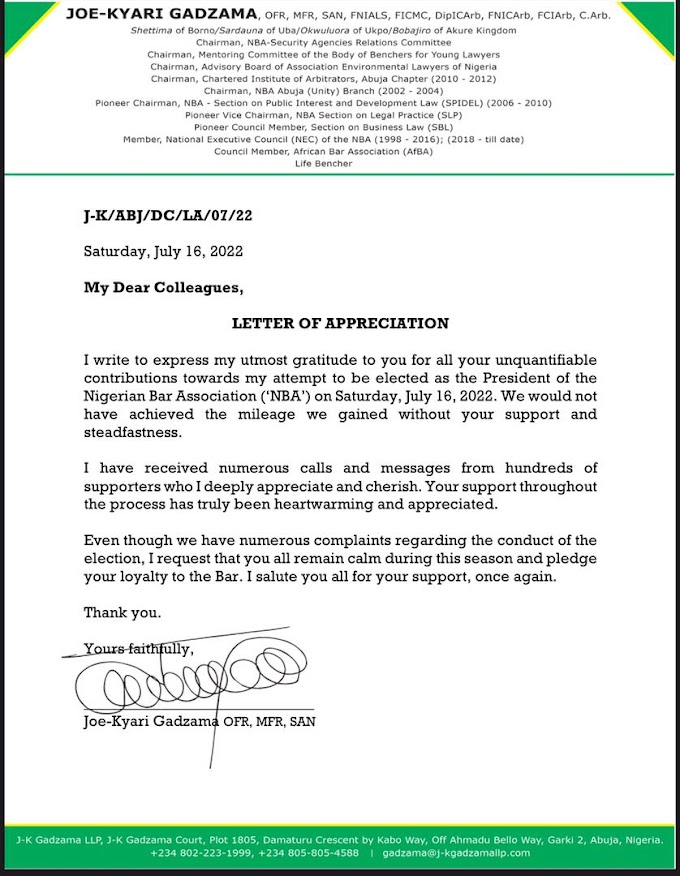MATTERS OF THE BAR 9 - SENIOR ADVOCATES OF NIGERIA (SAN)
In England, the root of our modern legal jurisprudence, the conferment of special status on lawyers who have distinguished themselves in practice and advocacy is well rooted. They are called the Queen's Counsel (QC) and they occupy the Inner Bar with all corollary benefits and responsibilities that go with it.
Nigeria adopted the principle in 1975 when 2 eminent members of the Bar, to wit: Chief Rotimi Williams and Dr. N. B. Graham-Douglas were called to the Inner Bar as Senior Advocates of Nigeria. It has become an annual ritual and a competitive application by lawyers who desire to be honoured.
The conferment has both honour and pecuniary values. With the honourees' cases called out of turn and special status that beckons the high and mighty, money is bound to follow. It puts something forward as a prize for hardwork and excellence that all who are gifted crave to be part.
Over time, a couple of issues have arisen on the conferment, to wit: what and who gets it? Yet another has crept in concerning the actual status of the conferee.
In 2009, a group of lawyers raised dust over anomalies in the rights of the conferees and abuse of the privileges. SANs come to court to argue simple applications for hours unend, take the inner bar exclusively while colleagues have no seats, call cases out of the list and give their juniors the right of way to develop, act uppishly and treat colleagues in contempt and are oftentimes given undue advantages by judex.
In addition, it was alleged that the process of conferment was not transparent and it was already a class and family matter with the leading lights bending the rules to accommodate their children and cronies. Further that the requirements of a number of cases on appeal leave the average lawyer sweating while those who work with the SANs have advantages. They called for the abolition of the title and made strong case with the fact that many jurisdictions had already abolished it.
Led by Late Pa Olatunji Gomez of blessed memory, the abolitionists took the case to a crescendo at the AGC in Kaduna in 2010. It was a tense atmosphere inside the marquee. Speakers after speakers, a compromise was reached to make amends by providing level playing ground and make it possible for all who are qualified to be conferred.
A decade after, the rules have been amended but not in line with agreement that much emphasis be placed on High Court matters as the appeal courts are congested.
Children and cronies still feature prominently on the annual podium with cases arranged for favoured ones. Only a few of those who meet the criteria get to the podium and it is much more cumbersome to earn on merit.
The level of discipline in the top echelon is waning and the decade witnessed the highest level of infraction of professional ethics by the class. It has become a level of cushion as members do not fall on the ground. Those who commit infractions often only lose their silk where other lawyers lose everything.
What is the implication of 'Senior' in SAN? If a lawyer is called in 1990 and another called in 2000 is called to the inner Bar, who is the senior? There is no law that promotes the silk over his seniors except the privileges of the conferment. But there is an empirical carriage of an inherent promotion over seniors. It is hereby submitted that it will be a wrong call that a conferment overrides the reality of the call year (without prejudice to the seniority within the SAN class). If the appellation of SAN suggests that, then the conferment had better be renamed Distinguished Advocates of Nigeria (DAN).
It is noteworthy that the whole essence of the conferment is to promote a culture of excellence, motivate lawyers and create avenue for lawyers of different cadres to learn from the Distinguished class. It is therefore submitted here that lawyers of certain age (like 25 or 30 years) postcall, who are still in practice and could meet some set criteria should be conferred even when they do not meet regular requirements. It is like doctors automatically turning to consultants after attaining 20 years of practice.
With new developments accommodating law lecturers, it is no longer about courtroom advocacy prowess but excellence in legal practice for which business law practitioners deserve consideration (Quaere the word 'Advocate') while the agitation of politicians, particularly legislators, remain jejune.
By the act of speaking at ceremonies like valedictories, opening of courts and launchings, the Body of Senior Advocates of Nigeria (BOSAN) rivals the Bar which must speak with one voice except in matters relating to the former's programmes and member(s).
Overall, the conferment of SAN on lawyers has created a motivating prize, an informal source of legal education and inspiration; and, a class responsibility in the profession. Most, if not all, of the honourees have lived up to the billing. It is a value worthy of keeping and cherishing as a leadership class but not as a weapon of oppression and closed-class opportunism.
(acknowledging the impact of a discussion with A. S. Abimbola Esq.).


.jpeg)


.jpeg)

0 Comments